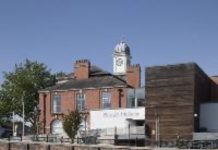An extraordinary project, which enables poetry writers to post their work on a beautiful historical and a modern-day digital map, has been charting the way people feel about identity and place in England and Wales since May 2019.
Now the project, led by poet Professor Paul Farley from Lancaster University and Professor Andrew McRae from the University of Exeter, will document Britain right up until the country is due to leave the European Union on 31 October.
Since the launch in May, more than 4000 poems have been pinned to the Places of Poetry map and public events held across England and Wales – from Stonehenge and Bath to the Big Pit and Byker.
The plan was to finish the project on National Poetry Day (3rd October) but in the midst of a national crisis and with the current government committed to the UK leaving the European Union on 31st October, the project co-ordinators have agreed to extend the deadline to capture people’s words and emotions at this time of significant upheaval.
The Places of Poetry project was inspired by Michael Drayton’s 17th-century work Poly-Olbion, a 15,000-line poem on the topography of England and Wales.
Professor Farley and Professor McRae have a ‘common obsession’ with Drayton’s epic poem.
Poly-Olbion was originally published with engraver William Hole’s highly decorative county maps.
In this modern version, a two-layered map – where detailed Ordnance Survey data is overlaid with a map of England and Wales modelled on Hole’s 17th-century version – poets can pin their poems to the exact location they describe.
Professor McRae said: “Living and working in Britain during 2019 means having a constant feeling that Brexit could knock everything off course at any minute. It is an arouser of unpredictable passions and a generator of huge uncertainty and introspection. It is an issue that has divided writers and commentators but also families and communities with a seismic impact on the country’s culture, history and psyche.
“Like many people across the country, we did not seek Brexit, but rather it was thrust upon us. We began planning Places of Poetry before Brexit was even a word, and even when we settled on the summer of 2019 we assumed that our European traumas would have been resolved.
“Over the last three years the problems and angst have only grown, and when Boris Johnson nailed his and the nation’s future to 31 October, we decided that we had to extend this zeitgeist project accordingly. We will accept our last poem at 11.59 that day.”
The Brexit poetry submitted so far ranges from Janine Booth, who pinned ‘Widening Roads’ to the A256 in Kent, reflecting on ‘lorries / carrying loads / of no-deal worries’. ‘Dover Beach Again’, by Woodwool, stretches from allusion to the Victorian Matthew Arnold, through the world wars, to the present day as it comments that ‘Europe / lies at the edge of sight.’ While in the Regal Café in Blackpool, Clayton Hirst is distracted from his vanilla slice by ‘The Daily Express’, warning of ‘benefits scroungers and Brexit scaremongers’.







